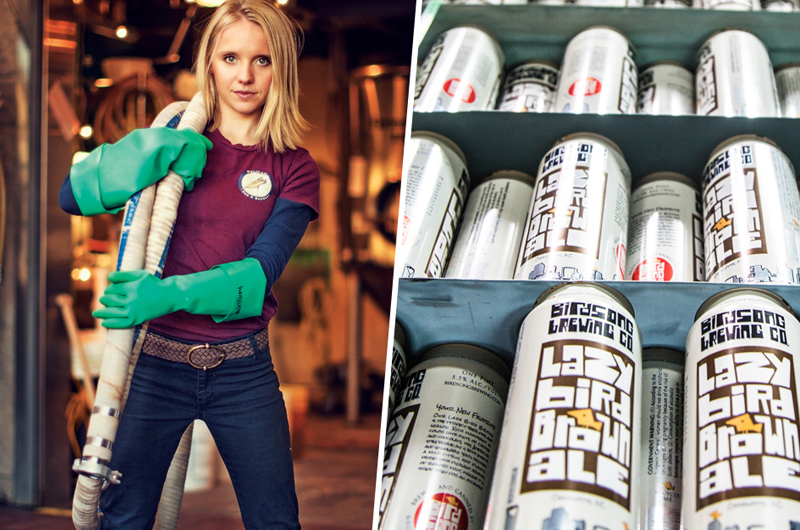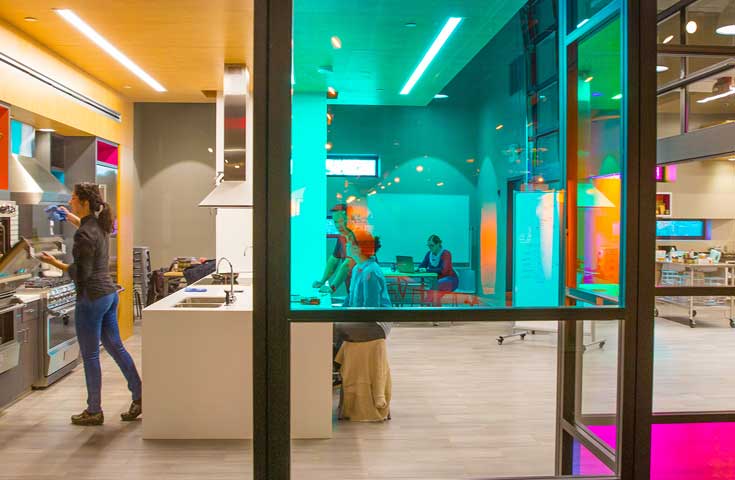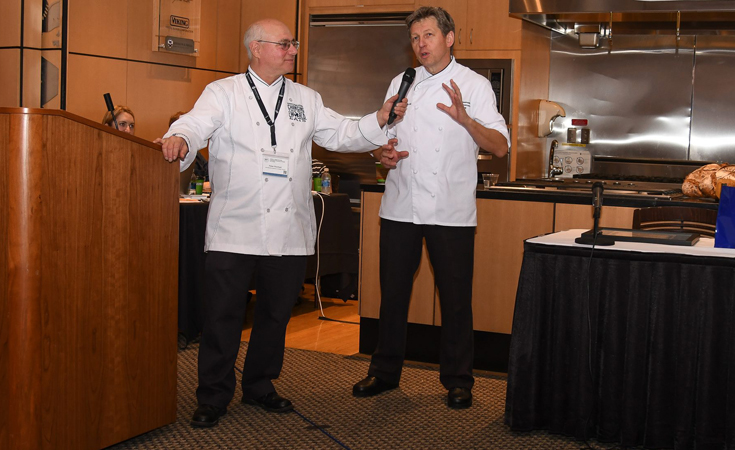1
Beer Is Big Business
A COUPLE OF MONTHS BACK, Josh Mersfelder '14 went truck shopping. He returned home with a charcoal-colored puppy instead, and promptly named her after an Australian hops variety.
Mersfelder recounts his story seated on a stool in his brewery’s tap room, gazing fondly at Ella as she smiles back, wagging her tail.
The anecdote reflects Mersfelder’s own journey, which led from his first love of cars to his discovery of hops — and the joy of beer making. As a teenager, he took on kitchen jobs to support his auto obsession. Continuing to JWU, Mersfelder developed a new passion, which brought him back home to upstate New York, where he is director of brewing operations at craft brewery Local 315, tucked into farmland west of Syracuse in a town called Camillus.
“It’s kind of surreal,” Mersfelder muses, holding a pint of his Retribution Double IPA and surveying the room. Bartenders pull from 16 handles to pour beers, sours and cider for visitors who have driven the back road off Interstate 90 in search of a cold custom-made brew on a hot summer’s day. “I told the owner I’d just be here to pick weeds and feed the pigs.” But after sharing his home brews — created using methods learned at JWU — Mersfelder got a call: “You can quit your job,” owner Dan Mathews said. “And start full time tomorrow.”
That was spring 2015. The brewery has taken off since day one, when the line snaked out the door and down to the goat house, and the bartenders couldn’t pour the beers fast enough. “It was like Woodstock,” says Mathews.
Nowadays, Local 315 has a comfortably packed taproom that overflows onto a spacious porch, where enthusiasts lounge in Adirondack chairs that overlook fields and forest. To the side is a beer garden, where area musicians play on a small wooden stage. Out front, food trucks rumble into the parking lot.
The wholesale side has taken off too, growing to more than 30 accounts in the first year. “I just locked down Cheesecake Factory,” Mersfelder shares. When the call to set up that account came, Mersfelder thought it was a wrong number. “This is Local 315,” he clarified, certain that the rep was looking for the mammoth Budweiser brewery the next town over, run by beer giant Anheuser Busch InBev. There was no mistake: Restaurant management wanted to make a local push.
Small-scale beers are now very big business. According to the national Brewers’ Association (BA), while total sales of beer dipped last year, craft breweries — defined by the BA as small, independent beer makers using traditional techniques — made a significant gain, with sales revenue growing by 16% to $22.3 billion, to comprise more than 12% of the nation’s overall beer market.
JWU has responded to student interest by creating a craft brewing curriculum, which kicked off at the Charlotte, Denver and Providence campuses this fall. A minor in craft brewing and a certifcate in professional brewing will be available in fall 2017.
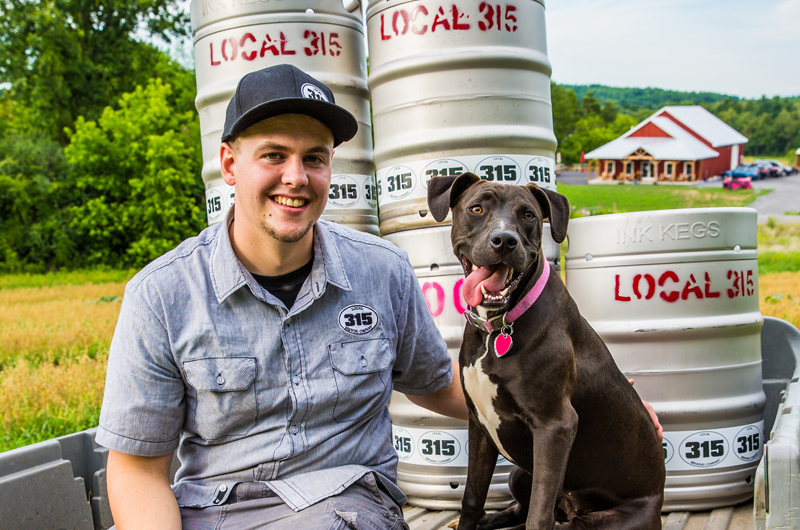
ASSOCIATE PROFESSOR JENNIFER PEREIRA was hired in 2003 as a wine specialist. But after her arrival at Providence, she was drawn to beer, which was given a lab day during freshman year. At that time, she thought, “They only have one day of beer. This has got to change.”
She created the JbreW Student Brewing Club. Hosting its inaugural Ocean State Homebrew Competition in spring 2011, the club saw 180 entries. JbreWers earned medals and more importantly the judges’ rave reviews for their success in organizing the event. “The club was really the only way to get experience and network in the industry,” says Pereira.
This past spring’s 500 entries included homebrews from as far a field as Oregon and California. Also last year, Pereira and students launched Providence’s official brewing team, the Wet Willies, which gives students increased access to off-campus competitions.
Academically, the university’s planned four-course brewing minor builds on its Brewing Arts class, which, says Pereira, “is really popular. Students work in teams and brew batches of beer at home.”
But student brewers, faculty emphasize, do not have an “Animal House” chug-a-lug sensibility. When Associate Professor CharLee Puckett asks his Denver students whether they’d pay the same money to get three craft beers or a mass-produced six-pack, the choice is unanimous: the smaller amount of craft.
The catalyst for today’s market? “You can thank Jimmy Carter,” says Pereira. In 1978, the president approved lifting restrictions on home brewing, and ushered in a re-education of beer drinkers. At that time, says Puckett, “It was whatever was cheapest and recognized.” Echoes Pereira, “Buying beer back then was like shopping for white paint.” Nor did overseas’ suds assuage that lack, she adds: “Most of the imports were spoiled by the time we got them.”
With the door opened for homebrewers, craft beer’s frontiersmen got to work. Now-legends such as Sam Adams founder Jim Koch shouldered the burden, carrying his brew door-to-door to bars and restaurants across Boston. “Look at how much they had to go through,” Puckett observes. “Now, people are willing to experiment.”
These kids have grown up in a world where there’s always been a huge supply of craft. They care about the local economy and where their food comes from. They understand that craft beer is a really important part of the business.ASSOCIATE PROFESSOR JENNIFER PEREIRA
2
Elevating the Art of Brewing
CHARLOTTE GRAD TARA GOULET '06 was looking to do just that after she and her husband Chris relocated to the Queen City. Settling in, there was one thing they couldn’t find: “We were buying six-packs of craft beer that had been shipped from the West Coast.”
So Chris Goulet harnessed his MBA and wrote a business plan. For additional investors, they turned to friends: a core group in well-paid corporate jobs who wanted to invest in something they believed in. Then the couple and their brewmaster, Charlotte grad Conor Robinson ’10, started learning from breweries across the state.
In December 2011, the Goulets and their friends opened Birdsong Brewing Company, on North Davidson Street in the Queen City. In a year, they were turning a profit, and, not long after, they could barely keep up with demand. By early 2014, they were running out of space.
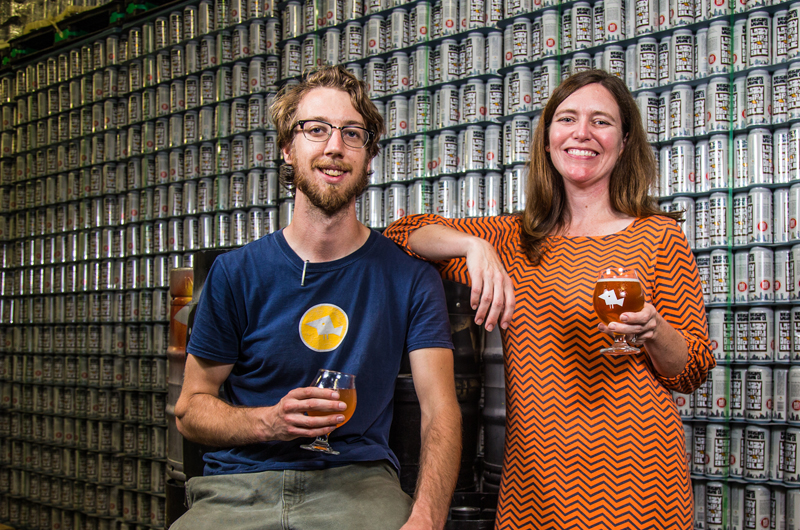
Today, the expanded Birdsong Brewing Company sits a mile down the road. With triple the capacity, the business has more than doubled its wholesale accounts to over 500 — and forecasts reaching as many as 1,200.
“Timing was a part of it,” Goulet says of their rapid success. “Charlotte was so lacking in small craft breweries.” Shortly before Birdsong opened, so did NoDa Brewing. “Right next door to us. We fed off of one another. If you’re making good beer and we’re making good beer, then that’s good for everybody. People are looking for small, local and craft — and they want to try something new all the time.”
“A rising tide raises all ships,” notes Charlotte Associate Professor Alistair Williams, who taught Robinson.
Birdsong, says Williams, was buoyed by a wave generated in the state’s capital in 2005, when, after a two-year battle, the “Pop the Cap” legislation passed, more than doubling beer’s allowed alcohol content to 15 percent. Currently, a fight is underway to increase craft brewers’ ability to self-distribute. “The economy of North Carolina is being shaped by these legislative changes,” observes Williams, who is studying the economic impact of craft breweries. “A lot of our graduates are getting positions in craft brewing — and not just in production. I can only see that continuing.”
Favorable laws have converged with demand. “Beer is part of a trend where people are looking for local products,” says Pereira. “Back in the ’90s brewers had to explain what a craft brewery was to the banks. Now I think the business world has more understanding.” Puckett agrees: “I can approach a bank with a business plan and point to all these other successes. The possibilities are limitless as long as you do the work.”
“Limitless” craft-brew possibilities and increasing market share have corporate beer makers pivoting. “We’re scared because y’all don’t like our product,” Puckett recalls one bigwig saying. “They can’t beat ’em,” he observes. “They can’t join ’em.”
They can, however, buy them — and leverage popular brands. “When your owner is a multinational corporation,” explains Williams, “you no longer fit into the craft brewing category. For the craft brewing side, it’s a bad thing because it confuses the market. Consumers think they are buying a genuine craft beer.”
3
No Limit to Craft Brew Creativity
DENVER GRAD WHITNEY BURNSIDE '10 is head brewer at 10 Barrel Brewing Company’s outpost in Portland, Oregon. She came on board in 2014, leaving Oregon’s Pelican Brewery for the chance to build out a new location for the popular craft beer maker, headquartered in Bend. A week after accepting the job, she heard the news: AB (Anheuser-Busch) InBev had bought 10 Barrel. “What the hell does this mean?” she thought. “Should I be mad? Will I be red? I decided, ‘What do I have to lose? And what could I gain from this: all the education and the ability to use really hard-to-get and expensive ingredients.’ ”
Recently back from a glamping trip at the company’s Elk Mountain Farm in Idaho, Burnside describes sleeping amidst the hops and dining at a long table set between the rows, tasting beers with brewers from other formerly independent InBev labels.
And in the Portland brewery: “So far, I have complete control. That’s been very surprising.” The result? “I can’t keep up with demand. We are the busiest 10 Barrel location.”
Burnside credits her culinary degree for providing a strong foundation: “Beer is cooking. I use the kitchen all the time.” Her recent coconut pale ale incorporated “a quick infusion” with hot wort (unfermented pre-beer) passed through a strainer with toasted and untoasted coconut. “Everyone is raving about it.”
As the industry has grown — since 2013, at a rate of almost two new craft breweries a day, according to the Brewers’ Association — so has the competition and the pressure. “No one knows where the ceiling is,” says Birdsong’s Robinson, “but the need to stand out is bigger. What makes one brewery’s beer different than the one across the street or across town? It’s very hard to constantly innovate and stay true to where you were originally.” He credits his creative brew crew with helping him keep up: “Just like any artist, I can’t always come up with some new beer every week.”
Birdsong’s expansion gives Robinson and his team room to create seasonal and limited-edition brews, while at the same time allowing for ramp-up of its regular line and lab space for rigorous testing, which underscores a reality perhaps obscured by the title “brewmaster.” “It’s not like being a celebrity chef,” warns Pereira. “It’s 90% cleaning, 5% accounting and 5% brewing.”
But for the passionate ones, that 5% is enough. Water, malted grains, hops and yeast come in many more hues than that plain old “white paint,” Pereira says, pointing to variations such as oyster stout and bacon beer. “There’s really no limit to what you can put in — with beer, all bets are off.”
Back at Local 315, Mersfelder, who took Pereira’s brewing class, describes the lengths he went to for his maple imperial stout, including substituting water with sap from a nearby farm’s trees. His quest is to use local ingredients, like the rhubarb for his Strawberry Rhubarb Blonde Ale, sourced from neighboring fields: “It tastes like a strawberry rhubarb pie."
“My heart is in this company,” says Mersfelder. “I love every second because of what we’re trying to do for the local farmers and ourselves.”
This is the passion sparked as a result of his early love for cars, when Mersfelder started down a culinary path as he washed dishes in local kitchens to pay for the restoration of his 1973 Chevrolet Nova Super Sport.
During his senior year, working with his landlord on a 1967 GTO, he pondered, “What the hell am I doing with my life?” He was given the age-old advice to do what made him happy. “That’s when I switched everything with Jennifer Pereira and [Associate Professor] Michael Sabitoni. In the last 10 weeks of my 4 years is when I decided what I wanted to do.”
In the tap room, leading explorers through a beer flight that incorporates Local 315-farmed hops — “our terroir, our taste” — he reflects: “It’s kind of unbelievable how it all worked out. It’s been a very rewarding, unforeseen journey.”
